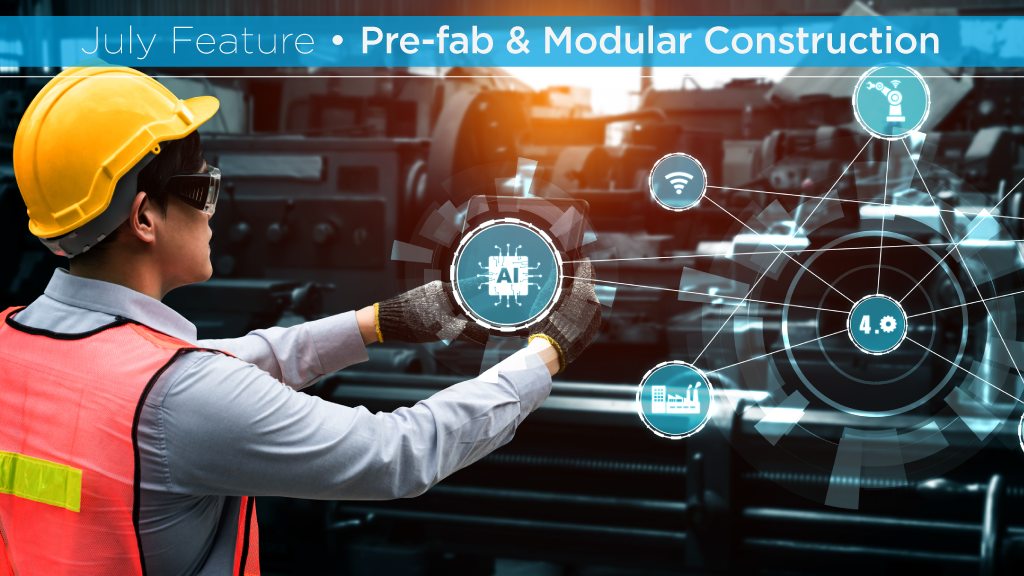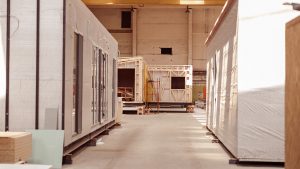Those in the know say artificial intelligence (AI) – the ability of computer software to “learn” from data so it can change its actions without more programming – is coming for all of us, and that includes the modular construction industry.
To get a sense of how AI could affect construction in general and modular in particular, the Journal of Commerce recently talked to some industry observers in the U.S. and Canada and asked them what they think.
John McMullen of the Modular Building Institute (MBI) in the U.S. says he’s sure AI will change the construction industry “forever.”
“But don’t all new technologies do that?” says McMullen. “Electricity certainly did. Robotics and automation is making a huge impact now. It’s just a matter of leveraging these technologies to build better buildings and further cement the advantages of modular.”
McMullen says AI’s potential in modular is virtually unlimited.
“Building plans could be optimized for the capabilities of specific manufacturers,” he says. “The quality control and plan approval processes could radically change. Efficiencies could be found and implemented to reduce building times and material waste. The possibilities are endless.”
The real question, McMullen says, is how modular builders and designers implement AI in order to best deliver modular’s benefits.
“I think it’ll be a gradual process, but, eventually, AI will be a valuable tool for the industry,” says McMullen.
MBI executive director Tom Hardiman says because AI is still so new, it’s unclear what sort of impact it will have on modular construction.
“We’ll have a better idea in a few months, once we start receiving requests from people to speak at the next World of Modular, the MBI’s annual conference, in 2024.”
Craig Mitchell, founder and principal of Blackbox Offsite Solutions Ltd. in Vancouver, says AI’s big opportunity in modular is on the design side.
“It shows a lot of promise for creating iterations of modular design that can adapt to different site characteristics and constraints.”
Puyan Zadeh, a research associate in the civil engineering department at the University of British Columbia, says AI and intelligent automation has significant benefits for the different stages of off-site construction.
For example, Zadeh says, AI can be used at the manufacturing stage for design and quality control, as well as to implement robotics.
AI can also improve logistics. It can forecast deliveries, anticipate transportation problems and optimize how prefab components are loaded and arranged on trucks.
And when it’s time for prefabs to be installed, AI tools can optimize the process by determining the best number of workers and amount and type of equipment, and by organizing work crews.
Zadeh says Building Information Modeling (BIM) is ripe for immediate disruption by AI.
“If we consider BIM as Building Information Management, however, the potential applications for AI is even greater,” says Zadeh. “BIM in this context requires extensive collaboration and co-ordination among different disciplines, which can be significantly enhanced by AI.”
AI can act as a virtual assistant, improve communication among team members and help make project scheduling more flexible and adaptive.
Dorian Tung, manager of building systems at FPInnovations, a non-profit research institute for the Canadian forest industry, says AI can be a boon to modular in the future, but right now smart robots with sensors are able to assemble standardized pre-fab components with everything the right size.
The future of construction lies in combining robotics, AI and other technologies such as automation, computation, software, sensing and networking, says Helen Goodland, head of research and innovation at Scius Advisory, a Vancouver consulting firm.
“Advanced manufacturing, as it is known, is already being done in many other industries,” says Goodland. “More construction companies need to get onboard now too. One local company that has already started is Intelligent City.”
Oliver Lang, co-founder and chief executive officer of Intelligent City Inc. in Vancouver, says his company takes what he calls a product-based approach to create housing solutions that are faster and more efficient to build, as well as carbon-neutral.
“We have developed a fully integrated housing technology platform called Platform for Life,” says Lang. “It combines design engineering, AI, parametric software, robotics and mass timber building systems.
“The result is a scalable platform with building solutions that are repeatable and adaptable. It is a fundamental departure from the custom-made, cost-prohibitive broken incumbent building solutions of today.”










Recent Comments
comments for this post are closed